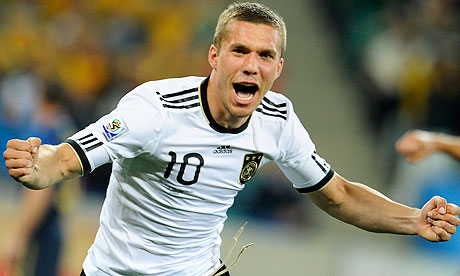What does Theo Walcott, Javier Zanetti, Ronaldinho, Nani, and Mario Balotelli have in common? They all once were controversially not selected by their national coach.
 |
| Fig 1. World Cup |
These players' exclusion could be cause by different reasons, namely; injury, internal conflict with the head coach, or simply because the coach thinks "he's not good enough". However, the nations from the five aforementioned players had a disastrous World Cup campaign four years ago. Sure, it could be caused by a horrific team performance overall, but it could due to the lack of contribution of these players.
The 2014 World Cup will be no different. There will be surprising inclusions and exclusions. For every Emile Heskey, there will be great inclusions such as Angel di Maria. And for every Karim Benzema, there will be considered 'better' exclusions like Raul Gonzales.
Then, what components are in there in a squad? What types of players will be called up for their respective nations? For your pleasure, I have categorized them into five different criterias.
Criteria #1: Reputation
Reputation is the first trait in every single national squad. Players with a huge reputation will always be called up by their head coach strictly because they are considered to be the star that will guide the nation towards success. He could go through a dismal season, or just healed from a injury, but if he is known to be one of the best in the country, no way he will be left out of the a tournament this big.
Don't think of names like Lionel Messi or Cristiano Ronaldo because they have proven their large rep. Try names like Wayne Rooney or Lukas Podolski.
 |
| Fig 2. Lukas Podolski |
Don't believe me? Ask David Beckham in World Cup 2002, or Fernando Torres in Euro 2012.
Criteria #2: Form
In the last on or two seasons before an international event, the consistency and performance of a player will influence strongly to getting a nod for a team spot. But not all in-form players will be called. Because unlike the first criteria, if you don't have a big reputation, you probably won't go. Just like the case for Darren Bent in South Africa 2010.
 |
| Fig 3. Pedro (left) and Sergio Busquets |
Criteria #3: Merit
They don't have a rising rep, and their form is nothing special, but because of a low stock in a certain position, he gets a chance to play for their national flag. It doesn't mean that they're bad or they don't deserve it, but there must be a reason why they aren't as popular like the first type or as consistent as the second type.
This attribution will usually be associated with an understudy goalkeeper like Victor Valdes. He may not be famous like Iker Casillas, but his record in Barcelona's net (albeit not entirely on his own) is impressive. So I say he strongly deserves his spot.
 |
| Fig 4. Victor Valdes (right) |
Even so, the case of deserving or not deserving of a player's inclusion to a squad usually isn't such a big problem. National team coaches knows better than us mere mortals.
Criteria #4: Young and Talented
 |
| Fig 5. Pele (center) |
Besides gaining personal reputation, the players of the fourth type could actually become a secret weapon. Examples include Michael Owen back in 1998, Thomas Muller in 2010, even Pele in 1958 version of the competition.
At such a young age, these three players became stars for their nations. Even at the tender age of 17, Pele alone helped Brazil win at his first international competition. Not bad for a kid.
Criteria #5: Wacky Wildcard
The fifth type is usally the devil of every team. His inclusion to the team is considered so absurd because he does not fit into any of the four types above. He doesn't have the fame, he's not young, his performance for his club is considered bad, and there are many more players that deserves to be called up above him from his country.
But for what ever reason, the coach brings him anyway. Some say that his inclusion could be caused by a conspiracy or an something out of an illuminati theory. But deep down we know, it was all down to the manager's error of judgement. The less from this category, the better the chance of a good tournament.
A good example for this type would be Vincenzo Iaquinta back in 2010. He only played 15 times and scored 6 in the Serie A in the season prior to the proceeding World Cup, but the Italy manager at that time, Marcelo Lippi, called him anyway and started all 3 games. He did score a penalty, but Italy were knocked out in the group stage.
The newest example from Euro 2012 could be the inclusion of ex-Liverpool winger Stewart Downing. In the 2009/2010 season, Downing did not score or even assisted. But whatever Roy Hodgson saw in him, it was enough to call him up to represent England. "Luckily" Downing never left the bench at the competition, but England went out in quarterfinals anyway.
 |
| Fig 6. Vincenzo Iaquinta |